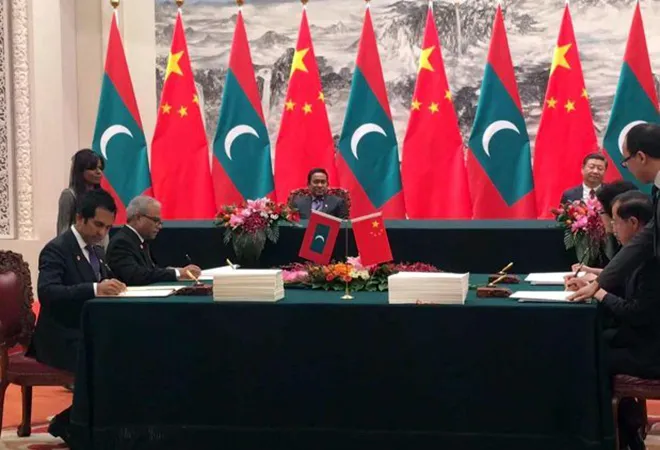The alacrity with which the Maldives embraced China seems to have caught India off guard. But New Delhi's engagement with Male has been hesitant off late and China has made the most of it. During the recent China visit of the president of the Maldives, Abdulla Yameen, the two nations signed 12 pacts, including a free trade agreement. Yameen also fully endorsed China's ambitious Maritime Silk Road initiative. President Xi Jinping declared that "China deems the Maldives as an important partner" in this initiative and Yameen repaid the favour by claiming that the Maldives viewed China "among closest friends" and that "the Belt and Road Initiative has greatly helped the development of many small and medium countries." At a time when China's belt and road initiative is beginning to attract scrutiny around the world, with even erstwhile supporters calling for a reassessment, such an endorsement is much sought after by Beijing.
The Maldives became the second country in South Asia, after Pakistan, to enter into a free trade agreement with China. The Yameen government pushed the FTA through the nation's Parliament, the Majlis, stealthily, with the opposition not attending the parliamentary session. The principal opposition party, the Maldivian Democratic Party, said that it was "deeply concerned over sudden and rushed Free Trade Agreement with China, without any disclosure of details to the public or to the MPs." The concerns of the opposition centre around a possible increase in trade deficit, already tilted in favour of China, and the strategic direction of the country. The MDP has argued that it is worried "that further entrenchment of the country into a Chinese debt trap will result in additional stress on strategic national assets and increasing instability in the Indian Ocean region."
But that is where Yameen wants to take his country it seems. On the one hand, he is flirting with Islamist extremism and on the other, he wants to use closer ties with China to shield his government from global criticism. After the first-ever visit by a Chinese president to the Maldives in 2014, it officially became a part of the '21st century Maritime Silk Road.' China quickly expanded its economic profile in the Maldives by building mega infrastructure projects, including the development of Hulhule island and a bridge connecting it to Male as well as the country's main international airport. A constitutional amendment allowing foreign ownership of freehold land was passed in 2015, which can potentially enhance Chinese military presence in the island nation. Already, Chinese naval ships have become regular visitors to Male.
During his 2016 visit to Delhi, Yameen had said his country pursues an "India first" foreign policy, describing it as the Maldives's most important friend. But that was just after India had shielded the Yameen government from punitive action by the Commonwealth's human rights and democracy oversight body. New Delhi's recent policy of engaging with the Maldivian opposition, especially the former president, Mohammad Nasheed, may be causing heartburn in Male and so the outreach to China has intensified. The Maldives remains the only country in South Asia which the Indian prime minister, Narendra Modi, is yet to visit.
The larger issue remains China's growing strategic footprint in the Indian Ocean region. Although the Yameen has reassured New Delhi that the Maldives will remain a "demilitarised zone", Chinese forays in Djibouti, Gwadar and Hambantota do not bode well for Indian interests. China may be eyeing the Maldives for its next big move to gain a foothold at key strategic points in the Indian Ocean at India's expense. This is only to be expected. China will make all efforts to challenge India's primacy in the region. India must provide an alternative model of leadership in the region. Every victory for China is not an inevitable loss for India. The challenge for India is to recognize the broader trend and take prompt ameliorative measures. Waiting can longer be a strategy.
This commentary originally appeared in The Telegraph.
The views expressed above belong to the author(s). ORF research and analyses now available on Telegram! Click here to access our curated content — blogs, longforms and interviews.




 PREV
PREV


